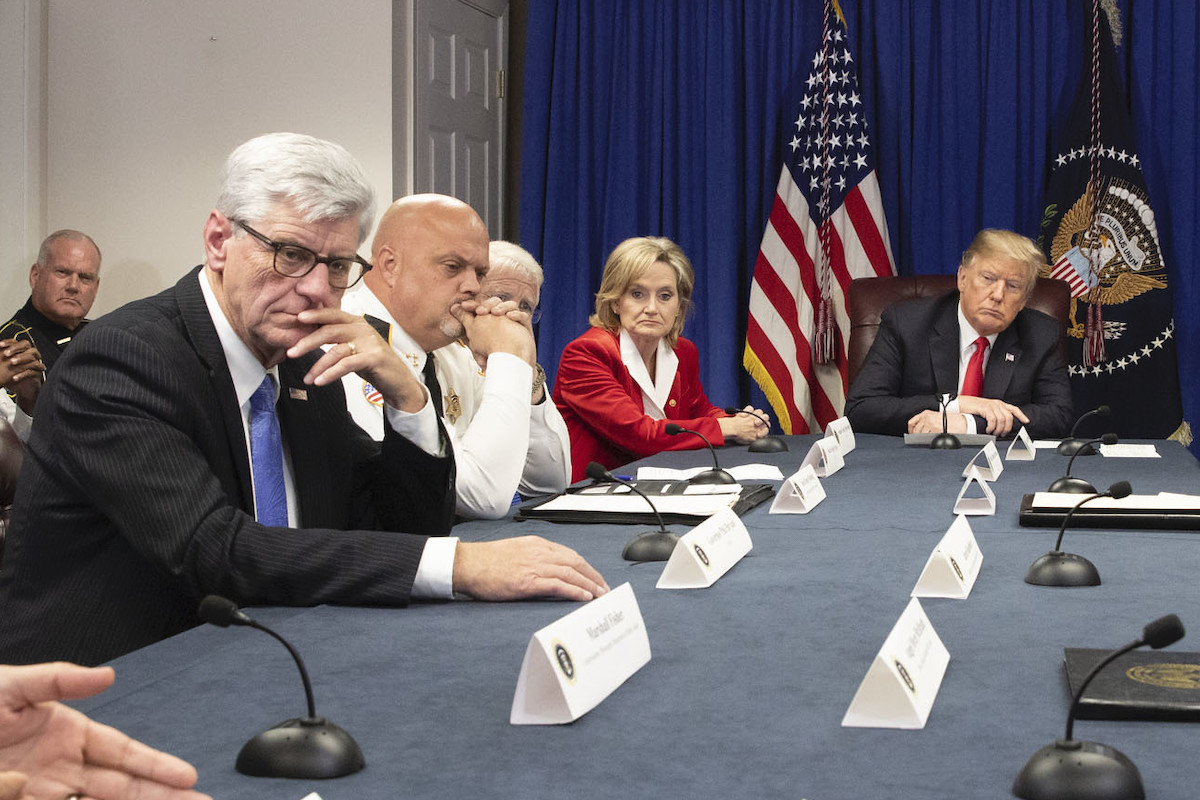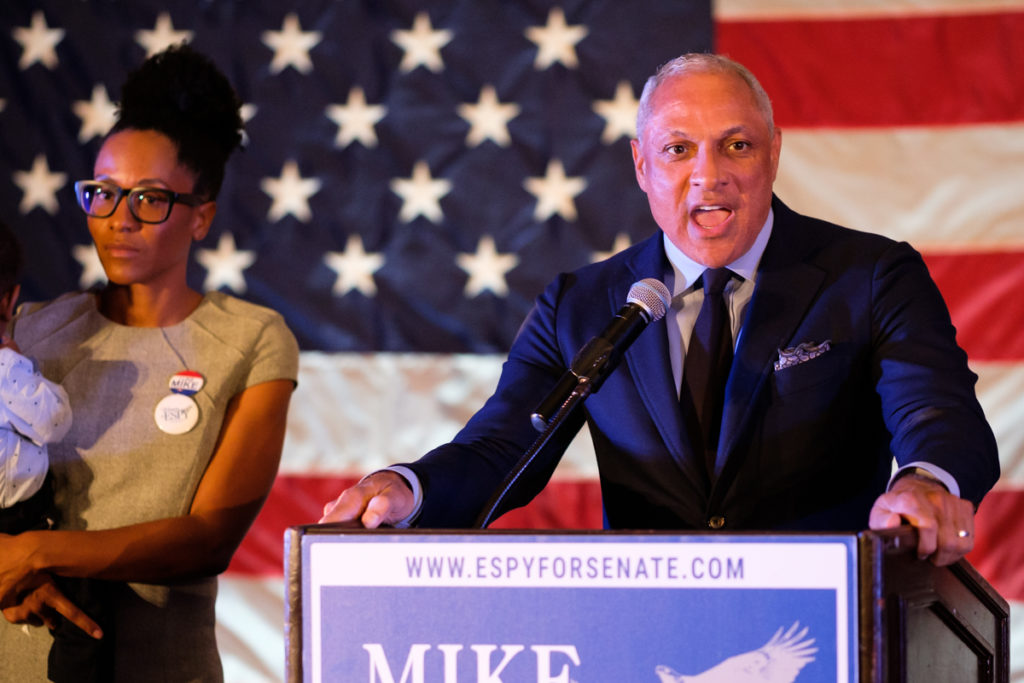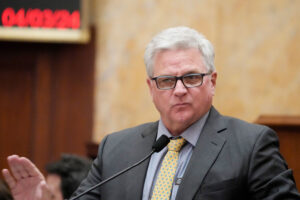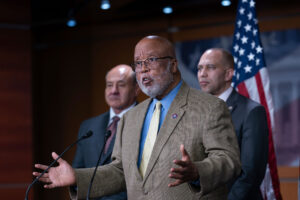Democratic U.S. Senate candidate Mike Espy raised more money on Saturday than any Mississippi candidate for federal office has raised in any one day in history, the campaign said. The record-breaking flurry of campaign donations came in the wake of U.S. Supreme Court Justice Ruth Bader Ginsburg’s death and President Donald Trump’s vow to appoint a replacement.
By 2:40 this afternoon, the campaign’s total haul since 7 p.m. Friday had topped $500,000.
“We raised $302,000 on Saturday alone,” Espy campaign communications director Kendall Witmer told the Mississippi Free Press today, noting that the average donor this weekend gave $28.
The surge in campaign cash came amid fears that Trump, with help from Republican senators like Espy’s opponent U.S. Sen. Cindy Hyde-Smith, will replace Ginsburg with a conservative justice and jeopardize voting rights, civil rights, LGBTQ rights, women’s rights and even health care for millions.
The Supreme Court is set to hear a case in November that the Trump administration is trying to use to overturn the 2010 Patient Protection and Affordable Care Act. Ginsburg’s death casts doubt on whether President Barack Obama’s signature law (often referred to as “Obamacare”) will survive—putting tens of millions of Americans, and at least 100,000 Mississippians, at risk of losing access to affordable health care.
In a statement shortly after Ginsburg’s death on Friday evening, Espy hailed the departed 87-year-old justice as “a legal trailblazer, standing up for the less fortunate to ensure protections for gender equality, voting rights, civil rights, and health care.”
As a young attorney in the 1970s, Ginsburg led the charge to dismantle gender discrimination in federal law, successfully arguing against such laws before an all-male Supreme Court on five occasions.
Espy, who in 1987 became Mississippi’s first Black U.S. member of Congress since 1881, served as U.S. secretary of agriculture under the same president who appointed Ginsburg—Bill Clinton.
“Justice Ginsburg will forever leave her mark on this country and on the lives of Americans,” Espy said in his Sept. 18 statement.
Hyde-Smith, Wicker Ignore Ginsburg’s ‘Fervent Wish’
By noon today, Witmer told the Mississippi Free Press, Espy had raised another $100,000, bringing his total fundraising since news of Ginsburg’s death broke to more than $420,000.
“These contributions will go toward continuing to build our historic organizing and (get-out-the-vote) effort that will impact Democrats and Democratic organizing up and down the ballot for years to come,” said Espy campaign Communications Director Kendall Witmer.
Republican leaders, though, quickly announced plans to help Trump confirm a conservative judge to replace Ginsburg before the election.

“President Trump’s nominee will receive a vote on the floor of the United States Senate,” Republican U.S. Senate Majority Leader Mitch McConnell said in a statement less than two hours after Ginsburg’s family announced her death on Friday night.
The statement ignored Justice Ginsburg’s final request, which she dictated to her granddaughter on her deathbed: “My most fervent wish is that I will not be replaced until a new President is installed.”
Over the weekend, both of Mississippi’s U.S. senators joined McConnell in bulldozing past the justice’s dying wish.
“Justice Ginsburg devoted her life to the law, becoming one of the most respected and influential women in our time. I appreciate her dedication and service to the nation. President Trump and the Senate now have the solemn duty to fill that vacancy, a process that should not be delayed,” Sen. Cindy Hyde-Smith said in a statement today. “I take this responsibility seriously, and I support the president’s intention to name a nominee as soon as possible.”
In September 2018, Hyde-Smith similarly declared she had a duty to support Trump’s Supreme Court nominee at the time, Brett Kavanaugh. After Christine Blasey Ford testified under oath in the Senate that Kavanaugh once tried to rape her at a party, Hyde-Smith used her first-ever Senate speech to defend the judge, saying it was her “duty … as the first woman to represent our great state in Congress” to “speak in strong support of Brett Kavanaugh.”
When conservative Supreme Court Justice Antonin Scalia died in 2016, nine months before the presidential election, Republican senators including McConnell and Mississippi Sen. Roger Wicker insisted that presidents should not be allowed to pick new Supreme Court justices in a presidential election year, blocking President Barack Obama’s nominee, Merrick Garland, from even getting a hearing in the Senate.
“This decision is too important and too consequential to let this current president make the decision in an election year. The next President should choose Justice Scalia’s replacement and American voters should have an opportunity to speak on this issue,” Wicker said in a 2016 statement.
Yesterday, though, Wicker took exactly the opposite position, joining Hyde-Smith and McConnell in encouraging Trump to make a speedy pick ahead of the November election.
“President Trump and Senate Republicans promised to confirm well-qualified, conservative judges and justices to the federal courts. We should continue to fulfill this promise and our constitutional duty for all vacancies as long as we are in office. I look forward to consideration of the President’s nominee by the full Senate,” Wicker said in a statement yesterday, offering no explanation for the double standard.
‘The Entire Affordable Care Act is at Stake’
Even if Trump is not able to appoint a new justice before the election, though, the Affordable Care Act could be in trouble.
“The entire Affordable Care Act is at stake,” Kathleen Sebelius, who served as the health and human services secretary in the Obama administration, warned on MSNBC today, saying millions of Americans are at risk of losing their health insurance—and in the middle of the COVID-19 pandemic.
Hyde-Smith supports the Trump administration’s effort to get the U.S. Supreme Court to strike down the 2010 law. The case is on appeal to the nation’s high court after the conservative U.S. 5th Circuit Court of Appeals in New Orleans (which hears cases originating in Louisiana, Mississippi and Texas) overturned the law.
The Affordable Care Act has survived several U.S. Supreme Court challenges before, though, with Republican-appointed Chief Justice John Roberts joining liberals on the court to uphold it. Court observers had expected it to survive once more, but Ginsburg’s death means that there are now only three liberals on a court with eight members instead of nine. For the law to survive, another Republican appointee will have to join Roberts and the court’s liberals this time.
Even if Trump does not get to appoint a new pick before the Supreme Court hears the case in November, a 4-4 split on the issue—with Roberts and the three liberals pitted against the court’s other four conservatives on the other—would mean the 5th Circuit ruling that struck down the law would stand.
If that happened, 100,000 Mississippians who currently purchase subsidized health care through the federal exchange on healthcare.gov would lose access to affordable health-care options, and the Affordable Care Act’s law that prevents health-care companies from discriminating against people with pre-existing conditions would be nullified.
Expanding Medicaid with federal assistance would also no longer be an option for Mississippi. Since 2013, the State has refused more than $1 billion in federal assistance a year that could have expanded the State’s Medicaid program and provided health care to as many as 300,000 Mississippians. Former Gov. Phil Bryant and current Gov. Tate Reeves have both cited President Barack Obama’s ties to the law as motivating factors for opposing it.
“I am opposed to Obamacare expansion in Mississippi. I am opposed to Obamacare expansion in Mississippi. I am opposed to Obamacare expansion in Mississippi,” Reeves told members of the press in 2019, pushing back against rumors that he was considering expanding Medicaid during his time as lieutenant governor.
Similarly, during her 2018 debate with Espy, Hyde-Smith declared that “Obamacare is the worst thing that happened to us.” Still, she also said she “strongly believes in pre-existing conditions,” referring to patient protections like those in the Affordable Care Act that will be struck if the U.S. Supreme Court decides to invalidate the law as the Trump administration is requesting.
‘They Don’t Think a Black Man in Mississippi Can Win’
This year marks Espy’s second time challenging Hyde-Smith for her Senate seat. He first ran against her in a 2018 special election after then-Gov. Bryant appointed her to fill a vacant Senate seat. In both elections, Espy has listed Medicaid expansion as one of his top priorities for Mississippi. This year, he is also campaigning on “building upon” the Affordable Care Act to include more people and lower costs.

In an fundraising email to supporters this afternoon, Espy highlighted the weekend’s fundraising successes, but said the campaign cannot stop there.
In Espy’s fundraising email today, Espy said the “weekend fundraising haul was truly incredible” and “we need to keep that momentum up” to respond to Hyde-Smith and mobilize voters.
Along with a record-breaking surge in campaign donations, hundreds of new volunteers signed up to help the Espy campaign make calls and send text messages to potential voters this weekend, Witmer, the Espy communications director, told the Mississippi Free Press this afternoon.
Other Democratic candidates for Senate and Congress saw a spike in donations this weekend, too, with the pro-Democratic non-profit ActBlue recording more than $91 million in donations to Democrats in the 24-hour period after Ginsburg’s death.
The boost for Espy’s campaign comes after he publicly decried the national Democratic Party earlier this month for ignoring his campaign.
“Democratic party leaders have ignored our race for the U.S. Senate in Mississippi. They don’t think a Black man in Mississippi can win—and they continue to count out the South and Black voters,” Espy wrote on Twitter.
Despite a lack of support from the national party, though, Espy came closer in 2018 to winning a U.S. Senate seat than any Democrat since 1982.
Espy won 46.4% of the vote in that election—a marked improvement over other recent Magnolia State Democratic candidates for U.S. Senate who failed to even crack 40% of the vote.
‘The Landmass That They Overlooked’
During the second quarter of campaign fundraising this year, from April 1 to June 30 of this year, Espy raised $670,000. But unlike the more than $500,000 he has raised this weekend so far with a $30 average donation, the candidate’s average donation during the entire second quarter was $345.
Espy’s weekend total could match or surpass his entire three-month haul from the second quarter by the end of the day. Already, though, he has raised more than triple Hyde-Smith’s sum for that period since Friday. From April until the end of June, Hyde-Smith raised $143,000 with an average donation of $266.
Hyde-Smith has not released information about her fundraising totals for the third quarter, which runs from July 1 to Sept. 30. Candidates will report their full third quarter fundraising totals at the end of this month.
Despite Espy’s fundraising prowess, though, his campaign has garnered little national attention this year.
In Kentucky, Democratic U.S. Senate candidate Amy McGrath, who is changing Senate Majority Leader Mitch McConnell for his seat, raised $47 million from the start of her campaign in 2019 until the end of June. Over the same period, Espy, who also launched his campaign in 2019, raised just $1.35 million. McGrath had support from the national party though; Espy did not.
Despite McGrath’s much larger war chest in Kentucky, several recent polls have shown her losing to the Republican leader by double digits. Recent Mississippi polls, on the other hand, have shown Hyde-Smith leading Espy by only single digits.
Before Justice Ginsburg’s death last week, on digital news show Roland Martin Unfiltered, Espy compared the national media and the Democratic Party establishment’s treatment of his campaign to the dismissive way national news outlets often omit Mississippi’s name during reporting on hurricanes in the Gulf—like referring to Mississippi only as an area of land “between New Orleans and Mobile,” but not by name.
“That’s Mississippi—the landmass that they overlooked,” Espy told Martin on Sept. 16. “They missed the name of an entire state. So I look at that and think about what’s been done to our campaign by the Democratic establishment in Washington. They’re overlooking this Mississippi possibility—they really are.”










